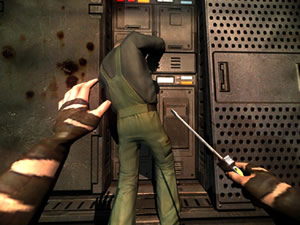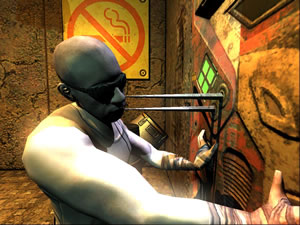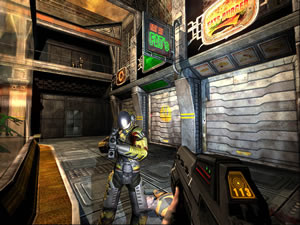Riddick Redux.
Spend enough time in the game industry and you’ll have plenty of chances to hear all sorts of people with very thick accents blather on and on about "Ze revolushnery take-no-logies" that make their game so wonderful. Usually, a slide-show is involved, then a computer malfunction, followed up by some inside jokes, and then, our favorite part: free cocktails. As much fun as their games are to play, listening to developers ramble on about the audio-recording process and the troubles Siegfried had with the A.I. will wilt even the freshest of noobie journalists.
That’s why the one new major inclusion to the PC port of Vivendi’s Xbox hit The Chronicles of Riddick: Escape From Butcher Bay is so disappointing. The PC version is dubbed Developer’s Cut for a good reason: once you beat the game, you unlock the ability to play back through "Commentary mode." Commentary mode is just like the regular game, but with little Starbreeze icons strewn about the environment. You walk up to one, press the Use key, and listen to a developer talk about the game. Thank God, because we had so many questions about the bump-mapping…
It’s not that we don’t care about the hard work and innovation behind Escape From Butcher Bay, it’s that we just don’t want to sit there and listen to some developer talk about it. While a view into the creative process is most welcome, we really would have preferred some more exciting enhancements in this port aside from one new scene.
That being said, The Chronicles of Riddick: Escape From Butcher Bay is still a fantastic game, and if you don’t own an Xbox, now is your chance to play one of the best action games of the year.
The Escape From Butcher Bay story lacks a concrete beginning or end, feeling more like a chapter in the saga of Richard B. Riddick, which I guess is fitting for a game that takes place as part of a chronicle. The only insight into Riddick’s origin is provided by his renown among the Butcher Bay prisoners; even these bad-asses fear the guy. But as tough as Riddick may seem, he’s been captured by the bounty hunter Johns, and is being sold into incarceration for the cancellation of a debt owed to the Warden.
While Johns’ ship is preparing to land, Riddick has a dream that acts as a subtle tutorial. In the dream, Riddick kills Johns and tries to escape from the prison. Throughout this short sequence, the player gets cues from Riddick and short explanations of his abilities. For example, as Riddick passes through a doorway into a dark area he’ll say something along the lines of ‘No one will see me now,’ which is accompanied by a dialogue box explaining crouching/shadows and the general stealth mechanics of the game.
Even though formalities such as tutorials, dialogue boxes and life-bars are essential to video games, the developers did a great job emphasizing the cinematic qualities of Escape
From Butcher Bay by getting rid of the HUD. What Riddick sees is what you see. If you look down, you see your legs and/or shadow. When you jump, you see your hands move to balance you. Riddick does have a life bar, although it’s only visible during combat situations. The result is highly immersive.
Unfortunately, Escape From Butcher Bay’s similarity to a film extends to its linearity. There are two short episodes that are open-ended and non-linear, but most of the game involves skulking through a room or down a corridor and killing whatever you come across in order to get to the next checkpoint save. Also, the plot threads introduced in these sequences never go anywhere. You never see any of the prisoners you speak to later, so there is no sense of plot continuity at all.
But in all honesty, this doesn’t really get in the way of the terrific gameplay. Escape
From Butcher Bay is played entirely from a first-person perspective, except when Riddick does something like climb a crate or kick out a grate. If Riddick is crouching and enters the shadows, his field of vision will assume a blue-tint, meaning guards cannot see him. And if Riddick is able to sneak up behind a guard, he can either grab the guard and kill him silently or go for a quick, noisy kill.
 When killing simply isn’t an option, Riddick can use the environment
When killing simply isn’t an option, Riddick can use the environment
to his advantage by scaling walls, crawling through ducts and shimmying along
ledges. Even though Riddick’s maneuvering capabilities aren’t new or particularly
diverse, the environments are so realistic and well-conceptualized that creeping
through them never gets old. The only feature I really miss is the ability to
distract the guards. Riddick can’t whistle or throw things or bang on surfaces
to misdirect his enemies, making him less sneaky than he ought to be.
Since
Riddick is in prison, he normally has little in the way of weaponry apart from
his fists or a shiv. And since most of the guards are heavily armed, Riddick
has to be extremely careful in dispatching them. Fortunately, if discovered,
Riddick can still kick ass the old-fashioned way. Melee combat is handled exceptionally
well for a first-person game, including the ability to string together combos.
During melee combat, your enemies are wonderfully nuanced. All enemies use combos,
some are more aggressive than others, some punch faster than others, and all
take extremely realistic-looking damage to their faces. Whack an enemy with
a blunt object and the marks on their face are different than is you used something
sharp, like a screwdriver or scalpel. After landing a few solid blows, a big
hit will stagger your enemy, leaving him wide open. At this point you can land
big shot after big shot to quickly put your foe out of commission. The whole
thing works beautifully.
The gunplay isn’t quite as well-implemented as the fisticuffs. Riddick eventually finds a tranq-gun, a hand-gun, a shotgun, an assault rifle, and a mini-gun. However, the hit detection isn’t great; most enemies don’t seem to react to getting shot physically until they die. If you manage to get extremely close to an enemy and blast him with the shotgun, for example, you may notice a slight flinch rather than a satisfying lurch.
Also, the enemies aren’t the smartest lot. They aren’t stupid, but they never go through doors and frequently stand out in the open waiting for you to show yourself. They throw grenades, but only during scripted sequences. Not bad, but not Half-Life, either.
What’s so cool about the stealth/shooter mix is the way you’ll go from being entirely unarmed, to bristling with guns, to entirely unarmed again. After being a death-machine for a good hour, the player will have to readjust to discretion. This adds a sensation of helplessness and vulnerability to the stealth portions, as well as a feeling of euphoria when you finally get your hands on a good gun again.
 Part of that euphoria, though, might be attributed to the game’s sweet graphics. Thanks to some fancy ‘normal-mapping,’ Escape
Part of that euphoria, though, might be attributed to the game’s sweet graphics. Thanks to some fancy ‘normal-mapping,’ Escape
From Butcher Bay can boast stunningly realistic environments. The entire prison world is beautifully and fully conceptualized, from the sickly green and orange lighting to the cracks in the doors.
A couple minor visual issues that affected the Xbox version make a return in the PC port; namely, some unsightly seams during cut-scenes and the way Riddick is forced to look through his knee-cap when crouching and sniping. Of course, the transition to the PC format allows for better framerates and a smoother feel, but it also opens the doors for technical issues. If you’re using a Geforce 6800 card, Riddick’s eye-flash will bug out if he gets too close to objects like walls, grates or boxes. This can seriously affect the gameplay, because you’ll be creeping around in the dark and suddenly, everything will go black. At least it isn’t a widespread video card issue, but 6800 users should take heed.
Escape From Butcher Bay sounds terrific, mainly thanks
to Vin Diesel and his supporting cast of voice talent. Diesel’s voice is perfect
for video games, and his character manages to come off as bad-ass with a sense
of humor rather than an ass with a bad sense of humor. The most notable cast
member is Ron Perlman, who provides the role of Jagger Valance, yet he
only speaks a handful of lines. The bulk of the game’s sound effects are absolutely
incredible, with blaring gun-fire, commanders barking orders through crackly
PA systems and generally excellent ambient sounds. Even the score is good, although
parts of it sound lifted straight from Metal
Gear.
The Chronicles of Riddick: Escape from Butcher Bay is good for about 12-15 hours of compelling single-player gameplay, but unfortunately there isn’t much keeping you coming back for more. A few other difficulty settings are here alongside some unlockable movies and commentary mode, but that’s not much, and amazingly the game features no multiplayer at all. It’s a shame.
But despite the fact that The Chronicles of Riddick: Escape
From Butcher Bay – Developer’s Cut is a somewhat short, linear romp with few enhancements over the Xbox version,
it still makes a good addition to any PC game collection with its awesome environments, savage melee combat and smooth pacing. So drop the soap and grab this game.









